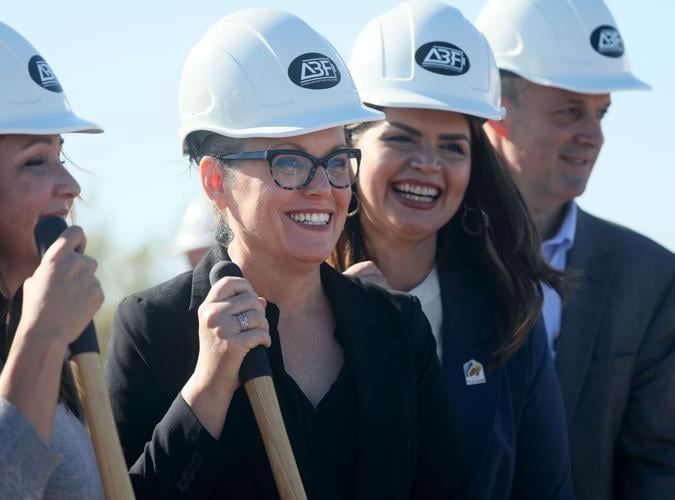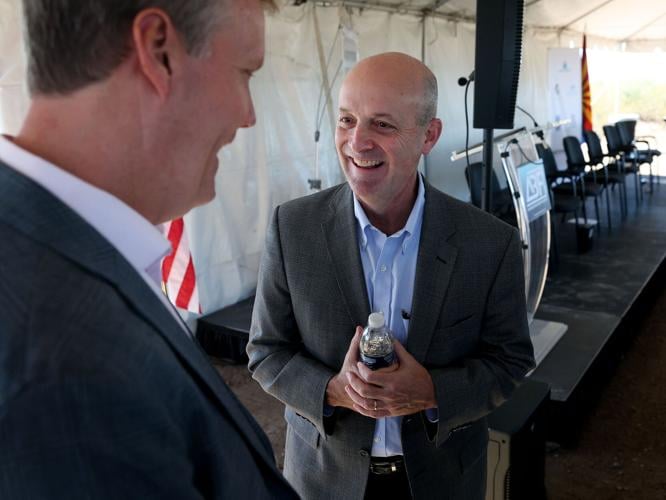American Battery Factory on Thursday broke ground on the first phase of a 2 million-square-foot “gigafactory” to produce lithium iron-phosphate battery cells south of Tucson International Airport, promising $1.2 billion in capital investment and about 1,000 new jobs at full buildout.
Gov. Katie Hobbs and local government officials and business leaders wielded golden shovels at a groundbreaking ceremony in Pima County’s nascent Aerospace Research Campus, where the first phase of construction of the planned fabric-covered buildings is expected to be completed by Sprung Instant Structures by 2025.

Arizona Gov. Katie Hobbs, second from left, shares a laugh with Regina Romero, second from right, and John Kem, far right, during a groundbreaking ceremony for the American Battery Factory that will be built at the Aerospace Research Campus south of the Tucson International Airport on Wednesday.
The battery factory, which is expected to employ about 300 workers initially, is expected to generate $3.1 billion in economic impact to the state over 10 years.
American Battery Factory, a spinoff of Utah-based battery pack maker Lion Energy, plans to make the Tucson plant its headquarters, the company’s chief marketing officer, Shaun Stirland, told a crowd at the groundbreaking.
“It will be the first of a network of giga factories that we’ll build across the country,” Stirland said. “But we’re grateful to be here for our corporate headquarters, that’s exciting for us.”
American Battery Factory President John Kem said the first phase of construction will also include a battery research center.
Kem said the new battery factory and ones to follow will help the U.S. reap the economic benefits of the “green revolution” now enjoyed largely by foreign countries.
“While U.S. firms have played a part, it hasn’t been a big enough part and in many cases, a lot of the work has been done overseas with just some of the final assembly in the U.S.,” he said. “We’re determined to change that, and we’re going to do that by working to source raw materials from inside the United States.”
Kem said that the company’s lithium iron phosphate battery chemistry is much safer and much longer lasting than traditional electric-vehicle batteries, which commonly use a nickel-cobalt-manganese chemistry.
The new factory will feature state-of-the-art manufacturing technology and leverage machine learning and artificial-intelligence technology, he said.

John Kem, right, president of American Battery Factory, says the new factory and ones to follow will help the U.S. reap the economic benefits of the “green revolution” now enjoyed largely by foreign countries.
Hobbs said the new plant is just the latest example of high-tech companies flocking to Arizona, including nine battery-related companies in recent years.
“This is a momentous occasion for Arizona’s advanced manufacturing ecosystem,” the governor said. “Arizona is quickly becoming a global epicenter for sustainable technologies, including electric vehicles, solar energy, semiconductors, and of course batteries.”
Joe Snell, president and CEO of Sun Corridor, said the effort to land American Battery Factory was competitive, but the local economic-development partners were determined to succeed.
American Battery Factory was lured to the area by the efforts of partners including Pima County, the city of Tucson, Sun Corridor Inc., the Arizona Commerce Authority, Pima Community College and Tucson Electric Power.

Rendering of the American Battery Factory planned for Tucson.
“It validates our position as a player in the clean energy revolution that’s occurring,” Snell said. “Most of the companies in our pipeline right now are made up of clean energy related industries — that’s never happened before.”
Tucson Mayor Regina Romero said the region’s governments, business leaders, Pima Community College and the University of Arizona have partnered to attract “green economy” companies to the area.
“Together we are creating the environment, the infrastructure and the community that brings green jobs to Tucson that will power our economy for years to come,” she said.
“American Battery will provide good-paying jobs here on Tucson’s south side and is vitally important to all of Pima County,” Pima County Board of Supervisors Chairwoman Adelita Grijalva said.
Under a lease-purchase agreement approved by the county supervisors in December, American Battery Factory will lease up to 267 acres of land at fair market value as determined by an appraisal.
The company will have the option of buying the land as soon as 30 months after the lease is finalized, at a price of about $21 million for all 267 acres, provided it makes lease payments on time and meets initial construction and employment milestones.






